- Home
- Leslie Meier
Irish Parade Murder Page 18
Irish Parade Murder Read online
Page 18
“I guess I didn’t realize what I was getting into,” said Ted. “It all seemed so noble, tackling abuse and corruption, restoring the democratic values our nation was built on . . .” He let out a long sigh. “I had no idea it would be so depressing and exhausting, or that the corruption would be so widespread . . . It seems like the sheriff has the whole county government in his grip.”
“Buck up, bucko,” said Lucy, causing Ted to smile. “We can’t do it all at once; we have to chip away, one story at a time. It doesn’t always have to be a big spotlight investigation; it can simply be an accurate account of the truth, like the paragraph in the school budget story about Dodd’s refusal to apply for state funding. We can leave it at that for now, and see if readers respond.”
“Good idea, Lucy,” said Ted, obviously relieved. “Let’s focus on getting Rob a fair deal.”
“I’m certainly on board with that,” said Lucy, deciding that she was definitely going to have a little talk with Allie Shaw. It might not make the paper, but could possibly provide new information that could help Rob’s defense. Checking her watch, she realized she had to dash, or she was going to be late for the big family meeting with Kate Klein at Bob’s office.
When she arrived, Bill and the girls, and Edna, were all sitting in Bob’s nicely appointed waiting room. Bill and the girls were on the roll-arm sofa, and Edna was perched on the edge of a wing chair upholstered in crewel fabric. Bob’s secretary, Dilys Lori Hemmings, was clicking away on a keyboard, but gave Lucy a warm smile when she arrived.
“Where’s Kate?” asked Lucy, aware that she herself was ten minutes late.
“I do hope she’s not lost,” fussed Edna. “She’s not familiar with Maine, and she’s coming all the way from Portland.”
“Everybody’s got GPS these days,” offered Sara. “It’s really hard to get lost.”
“Could be traffic,” said Bill, philosophically.
“Or maybe she’s chickened out,” said Zoe.
“That wasn’t very nice, Zoe,” chided Edna. “I think once you all meet her, you’ll see what a lovely, kind person Kate is.”
“Sorry, Mom,” said Bill, “but I just don’t see why you’re so keen on her. It’s just complicating everything, especially since you can’t find Dad’s will. Meanwhile, the clock is ticking, and we’ve all got better things to do.”
“Shame on you, Bill,” said Edna. “You know family is more important than anything . . .”
“My real family,” began Bill, stopping mid-sentence when the office door opened and Kate Klein arrived. Unlike her subdued appearance at the funeral, today Kate was dressed in a bright red coat and shiny black, high-heeled boots. She was carrying an expensive designer handbag, and her hair had been freshly highlighted with blond streaks.
“I’m so, so glad to be here,” she began, breathlessly, going straight to Edna and taking both her hands. “I’ve dreamed of this day,” she continued, drawing Edna to her feet and enfolding her in a big hug. She turned and surveyed the room. “My family, at last,” she cooed, arms outstretched. Then she went around the room, greeting each person individually. “You must be Bill, my brother,” she said, attempting a hug, but desisting when she saw Bill recoil. “And dear, dear Lucy,” was her next attempt, rather more successful since Lucy submitted to a light hug and an air kiss.
“And these are the wonderful girls I’ve heard so much about,” she exclaimed, getting stony looks from Sara and Zoe. Undeterred, she continued, “Now which is which? Who is the scientist, and who is the linguist?”
Zoe rolled her eyes and muttered, “I’m Zoe.”
“I’m Sara,” said her sister, reluctantly.
“Well, well, isn’t this just amazing,” enthused Kate.
“Uh, it sure is,” said Bill. He turned to Dilys and asked her to tell Bob that they were all here and ready to proceed.
There was an awkward pause as they stood up and gathered outside Bob’s office door, but he was quick to admit them, urging everyone to seat themselves in the captain’s chairs he’d arranged in a half-circle in front of his desk. He then seated himself behind the desk and introduced himself to Kate and Edna.
“We’re all here today because Kate Klein has presented DNA evidence that she is the daughter of the late William Stone and wishes to be acknowledged as such by the Stone family. Is that right?” began Bob.
“Yes,” said Kate. “I recently did one of those gene tests, and that’s what the results showed.” She pulled a couple of sheets of paper out of her black alligator bag and leaned forward, passing them to Bob.
Bob studied the papers, then turned to Kate. “Was this the first you knew of your father? Did you have a relationship with him? Did he visit? Did your mother ever mention him?”
“No.” Kate shook her head and looked very sad. “It’s something I regret very much. You see, my mother died when I was very young, and I was raised by an aunt and uncle . . .”
Edna gave a little gasp, followed by a sympathetic, “Oh.”
“And I’m afraid they weren’t very nice people. They made it very clear that I was an unanticipated and unwanted responsibility.”
This time Edna’s “Oh” was louder, and she shook her head.
“I see,” said Bob. “And now, I must ask, are you planning on making any financial claims against the Stone family?”
“Absolutely not, I wouldn’t dream of it,” exclaimed Kate. “As it happens, I’m alone in the world; my aunt and uncle have passed, and I have no other relatives. Well, until I got this DNA report and discovered I really do have a family, and I’m just so happy to meet them all and hope they’ll welcome me.” She turned and gazed briefly at each member of the family, one by one. “I know it’s a lot to ask, but blood is thicker than water, and I’m sure that when you get to know me, you’ll realize we have a lot in common.”
“Oh, yes,” said Edna, hopping to her feet and going to Kate, reaching out to her, and clasping her in a hug. “You’ve been through so much, my dear, but now that’s over, and you have a family!”
Lucy and Bill glanced at each other in shared dismay, then turned to Bob. He responded with a wry smile and a shrug.
“Well, I guess we’re done here,” said Bill, standing up. “Let’s all get something to eat.”
“And a stiff drink,” added Lucy, under her breath as she took his hand.
Chapter Sixteen
Looking back on the meeting and subsequent luncheon with Kate as she left the office, free for the afternoon now that it was past deadline and the paper had been put to bed, Lucy had mixed feelings. Kate seemed nice enough, but perhaps rather more vivacious and openly emotional than Lucy was used to, now that she’d lived for so long among her reserved Maine neighbors. It almost seemed that Kate was putting on a show for them, knocking herself out to win them over. So far, Edna was the only family member who was falling for it, grieving for her lost husband and embracing Kate as the daughter she’d always longed for. Kate neatly filled the void in Edna’s life, but the others were doing just fine without her. For them, it was a question of whether this new person was going to add something to their family life, and so far as Lucy could see, the answer was no.
Bill clearly saw her as a rival for his mother’s affection and attention, but more importantly, he felt responsible for Edna. He was the man of the family, now that his father was gone, and was committed to securing his mother’s welfare and protecting her assets. He was naturally suspicious of Kate’s motives and wasn’t convinced they were entirely honorable.
The girls couldn’t care less about Kate. For one thing, she was of a different generation, too old to be a friend, more like an aunt. They’d never had an aunt, however, since Lucy and Bill were both only children, and didn’t feel the need. They were both busy with friends and plans for their future; it wasn’t at all clear how Kate would change anything for them. Now, if she’d boasted of important connections who could help them with their careers, they might be more interested, but since she was
presenting herself as a needy, friendless orphan, they didn’t see any advantage in getting involved.
As for herself, Lucy was trying to keep an open mind. She wasn’t as suspicious of Kate as Bill was, but she wasn’t taken in by her overblown show of family feeling, either. She didn’t want to be mean, and perhaps Kate and Edna could develop a genuinely positive relationship that would benefit both of them. A relationship like that would benefit her, too, because Kate would share responsibility for Edna, a responsibility that Lucy knew would only grow more demanding in the coming years, as Edna aged. Nevertheless, Lucy couldn’t rid herself of a niggling little doubt about Kate, a feeling that something was off, that she was pretending to be someone she wasn’t. That didn’t necessarily mean that she wasn’t actually Bill’s half sister; maybe she was just trying too hard to gain acceptance as a member of the family.
Or was she, wondered Lucy, recalling yesterday’s luncheon at Murley’s Family Restaurant. Kate had sat next to Edna and had pretty much ignored the rest of the family. At Bob’s office, she’d spoken of her intense desire to join the family, but over a plate of Cobb salad, she hadn’t shown much interest in Bill’s antique home restoration business, Lucy’s work as a reporter, Sara’s new job at the museum in Boston, or Zoe’s decision to change her major once again. The only member of the family that interested Kate was Edna.
Passing the IGA, where the parking lot was mostly empty this early in the morning, Lucy switched mental gears and impulsively decided to see if Allie Shaw was working in the market’s bakery. She could pick up some fresh muffins to take to the office, and maybe learn a bit more about Gabe McGourt. The bakery was on the side of the store farthest from the door, so Lucy gave Bert, the deli guy, a big wave, smiled at Carrie behind the fish counter, and chatted a few minutes with Ralph about the sudden disappearance of New York sirloin from the beef offerings. They agreed that those newfangled petite sirloins were tough, and T-bone, porterhouse, and rib-eye steak were all too expensive, and Lucy confided that Bill really missed his Saturday night sirloins. “I’ll get you a T-bone. I can label it a manager’s special, just for you,” promised Ralph.
Lucy wasn’t sure this was entirely aboveboard and questioned him. “Are you sure that’s okay? I don’t want you to get in trouble.”
“No problem, Lucy,” said Ralph. “I’m the new meat manager.”
“Congratulations, and thanks,” said Lucy, smiling broadly. “I’ll grab it on my way back.”
Continuing past the dairy cases, where Maggie Poor was stocking the yogurt shelf, Lucy finally arrived at the store bakery, where the delicious scent of baking bread filled the air. Allie Shaw was busy decorating a birthday cake, but looked up to ask if she could get something for Lucy.
“What a good job you’re doing,” said Lucy, admiring the pink roses and green leaves that Allie was applying to the chocolate sheet cake. “Whenever I try to decorate a cake, it sure doesn’t come out looking like that.”
“You need to know the tricks of the trade,” said Allie. “Also, good equipment helps.”
“Yeah,” agreed Lucy. “I just get those squeeze tubes of icing . . .”
“They’re really hard to control,” said Allie. She was still petite, but had filled out a bit and was no longer the emaciated high schooler Lucy remembered. She had a pair of cat’s-eye glasses perched on her pert little nose, her long hair was tucked in a net, and she had a butterfly tattoo on her neck.
“I thought I’d get some muffins to take into work,” said Lucy.
“I just stocked the case,” said Allie, with a nod at a glassed-in display in the shape of an old-fashioned wheeled cart. “The blueberry ones are fresh out of the oven.”
“Great,” said Lucy, looking over her shoulder to make sure the coast was clear before stepping closer to the counter and lowering her voice. “Allie, there’s something I want to ask you about. I know you spent a little time in the county jail, where you had some interactions with Gabe McGourt . . .”
Allie’s eyes practically popped out of her head. “Look, I don’t want to talk about that. They took me back here with no questions asked; it’s all in the past. I’m not looking for trouble.”
“I understand,” said Lucy, nodding sympathetically. “I’m not judging, and I don’t want to get you in trouble . . .”
Allie’s face was quite red, and Lucy didn’t think it was from the heat of the oven. “But you’ll put my name and that I’m an ex-convict in the paper!”
“I don’t have to use your name, and I don’t need to put anything in the paper. That’s not why I’m asking. I’m just looking for some background on this guy that might help Rob Callahan. He’s the new reporter at the paper, and he’s been charged with murdering McGourt.” Lucy paused for breath. “They’re making McGourt out to be some big hero, and you and I know that’s not true.”
“You can say that again,” muttered Allie, squeezing out a perfect border of green leaves.
“And maybe this trial will reveal the truth about the sheriff and the jail he’s running,” said Lucy, hoping she’d managed to convince Allie to open up to her.
Allie was quiet, seemingly trying to decide what to do. Finally, she let out a big sigh and put down the pastry bag. “I don’t think any of this is news; everybody knows it, they just don’t want to talk about it or think about it. You take away people’s rights, put them in a situation where they have no power but are under the complete control of those in authority—well, what do you think is going to happen? The ones with all the power are going to take advantage of the ones with no power, and that’s what happens at the county jail.”
“And when you throw in sex . . .” suggested Lucy.
“It’s always there, the threat,” said Allie. “And if you don’t do what they want, they can punish you. You can end up in solitary, or cleaning toilets; they can do whatever they want to you.”
“What about Gabe?” probed Lucy.
“He was the worst. Some of the others were strictly professional and played it by the book. Others would give you stuff if you were nice to them: that’s how they put it: ‘If you’re nice to me, I’ll be nice to you,’ they’d say, and some of the girls would do stuff with them. But Gabe McGourt was scary, menacing. There was always violence, kind of lurking under the surface.”
This was a hard question to ask, but Lucy had to know. “Did he rape you? Or hurt you?”
“Actually, no,” said Allie, with a shake of her head. “I’m not very big, and I worked real hard at not attracting attention. I kept my head down, kind of hid behind the larger women.” She let out a laugh. “Honestly, I don’t think he knew I was there. I don’t think he ever noticed me, he was so busy with the big, busty girls.” She picked up the pastry bag. “That doesn’t mean I wasn’t terrified of him.”
“Thanks for telling me all this,” said Lucy. “I know it couldn’t have been easy.”
Allie smiled. “Actually, I feel a little better talking about it. I’ve been keeping this all in too long.”
“You take care, and stay out of trouble,” advised Lucy, grabbing one of the flattened boxes from the shelf beneath the muffins and opening it up. She used the provided tongs to fill the box with a half-dozen blueberry muffins.
“I intend to,” said Allie. “Enjoy your muffins.”
“They look delicious,” said Lucy, before retracing her steps through the store, back to the meat counter. There, Ralph had her manager’s special wrapped and ready to go. “Say hi to Bill for me,” said Ralph. “And by the way, I’ve got a window casing that’s rotted. Do you think he could take a look at it for me?”
“I’m pretty sure he could,” said Lucy, taking the wrapped meat that she was shocked to see was priced at ninety-nine cents a pound. She’d expected a bit of a break on the price, but not this much. She considered returning it, saying she really couldn’t accept such a big reduction, but didn’t want to embarrass Ralph. He’d only been trying to be nice. So she smiled at him and said, “Thanks.”
<
br /> Walking to the checkout, Lucy grew more uncomfortable about the steak, which was only compounded when Dot, the cashier, eyed the package doubtfully. “Chicken gizzards?” she asked.
“For stock,” lied Lucy, promising herself that she would never again accept one of Ralph’s manager’s specials. It reminded her too much of the tit-for-tat situation at the county jail, and she didn’t want to be indebted to Ralph in that way, or to anyone.
Ted wasn’t in when Lucy arrived at the office the next morning, but Phyllis was at the reception desk, decked out in kelly-green reading glasses and a green-and-white-striped sweater, with some rather large shamrocks dangling from her ears. A huge bunch of Irish daffodils bloomed on her desk. “You’ve got the spirit, I see,” said Lucy.
“Erin go bragh,” she announced, with a big smile.
“And what, might I ask, does that mean?” teased Lucy.
“Haven’t got a clue. My husband’s family came from Sweden, and mine is from Germany and Holland.”
“Well, everyone’s Irish on St. Patrick’s Day, right?”
“Look, it’s March in Maine,” said Phyllis. “It’s cold and gray, and the snow is filthy, and there’s mud everywhere. Truth be told, I’m dying for a glimpse of green and just trying to avoid falling into depression.”
“Point taken,” said Lucy, realizing that Phyllis was on to something. January was a big letdown after Christmas. February brought Valentine’s Day, which was a decidedly mixed blessing, depending on the state of one’s love life, and March offered the promise of spring, but usually failed to deliver. No wonder people threw themselves into St. Patrick’s Day festivities like shipwrecked sailors piling onto a lifeboat.
When she sat down at her desk and powered up her computer, Lucy found herself experiencing writer’s block. She had plenty of assigned stories to write, but couldn’t get started. Her emotions were unsettled, and somehow the picky details in the town budget and the upcoming town meeting with several contentious articles on the warrant didn’t grab her attention. Her mind kept wandering, and she couldn’t focus on her work. She was thinking instead about Kate Klein and wondering about her motives, and about how easy it was to step onto that slippery slope and become dishonest, even about something as small as a piece of steak. She thought about power and how it corrupts, about Gabe’s burning truck and the hundreds of officers at his funeral. Were they mourning or presenting a show of intimidating force? Were they expressing genuine grief or issuing a warning? Or both?

 Christmas Card Murder
Christmas Card Murder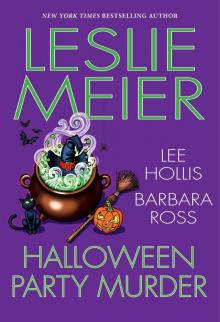 Halloween Party Murder
Halloween Party Murder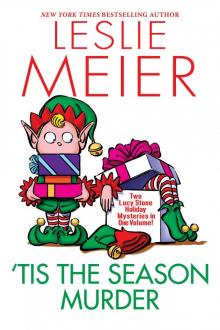 'Tis the Season Murder
'Tis the Season Murder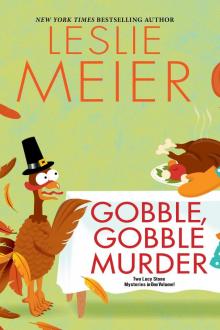 Gobble, Gobble Murder
Gobble, Gobble Murder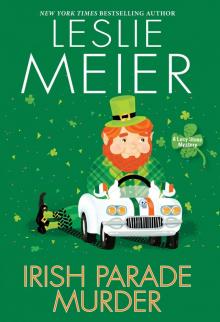 Irish Parade Murder
Irish Parade Murder Bake Sale Murder
Bake Sale Murder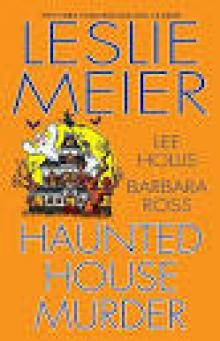 Haunted House Murder
Haunted House Murder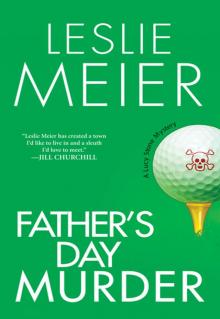 Father’s Day Murder
Father’s Day Murder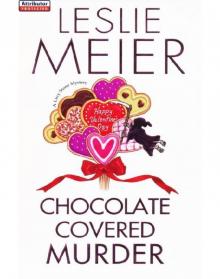 Chocolate Covered Murder
Chocolate Covered Murder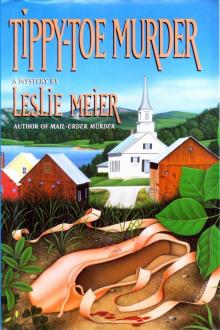 Tippy Toe Murder
Tippy Toe Murder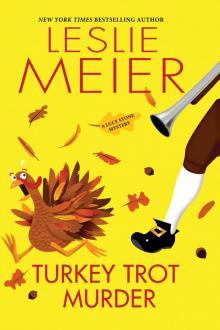 Turkey Trot Murder
Turkey Trot Murder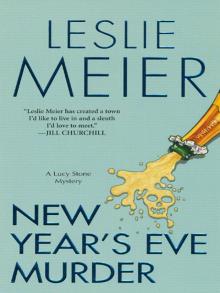 New Year's Eve Murder
New Year's Eve Murder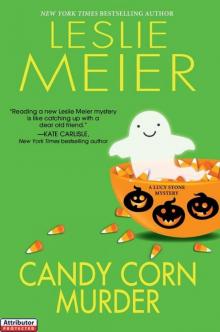 Candy Corn Murder
Candy Corn Murder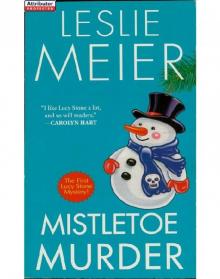 Mistletoe Murder
Mistletoe Murder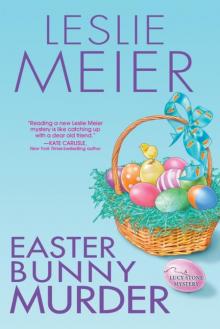 LStone 20 - Easter Bunny Murder
LStone 20 - Easter Bunny Murder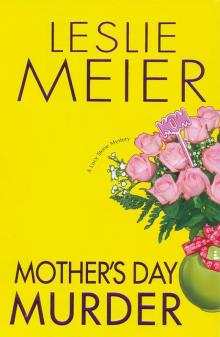 Mother's Day Murder
Mother's Day Murder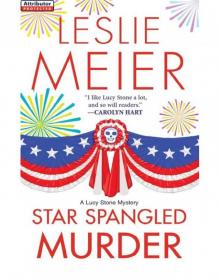 Star Spangled Murder
Star Spangled Murder Silver Anniversary Murder
Silver Anniversary Murder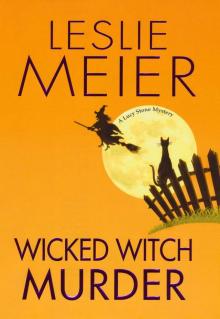 Wicked Witch Murder
Wicked Witch Murder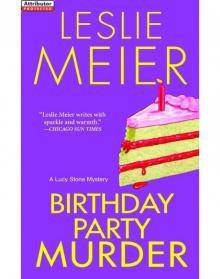 Birthday Party Murder
Birthday Party Murder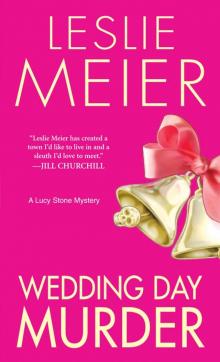 Wedding Day Murder
Wedding Day Murder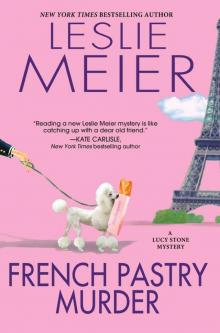 French Pastry Murder
French Pastry Murder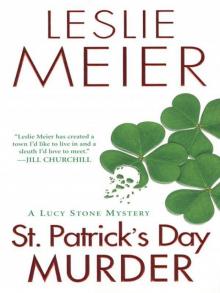 St. Patrick's Day Murder
St. Patrick's Day Murder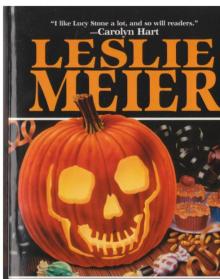 Trick or Treat Murder
Trick or Treat Murder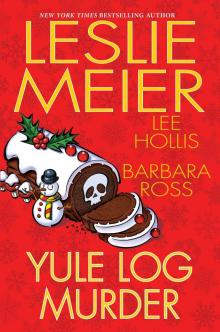 Yule Log Murder
Yule Log Murder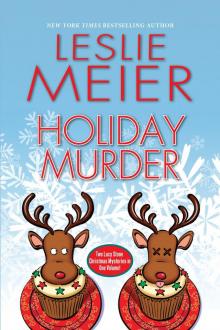 Holiday Murder
Holiday Murder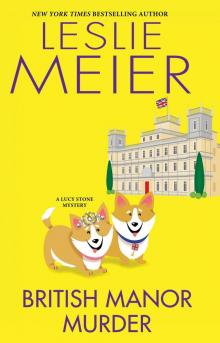 British Manor Murder
British Manor Murder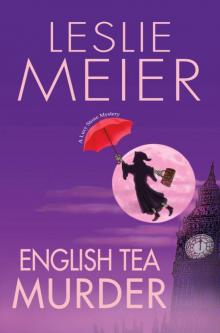 English Tea Murder
English Tea Murder